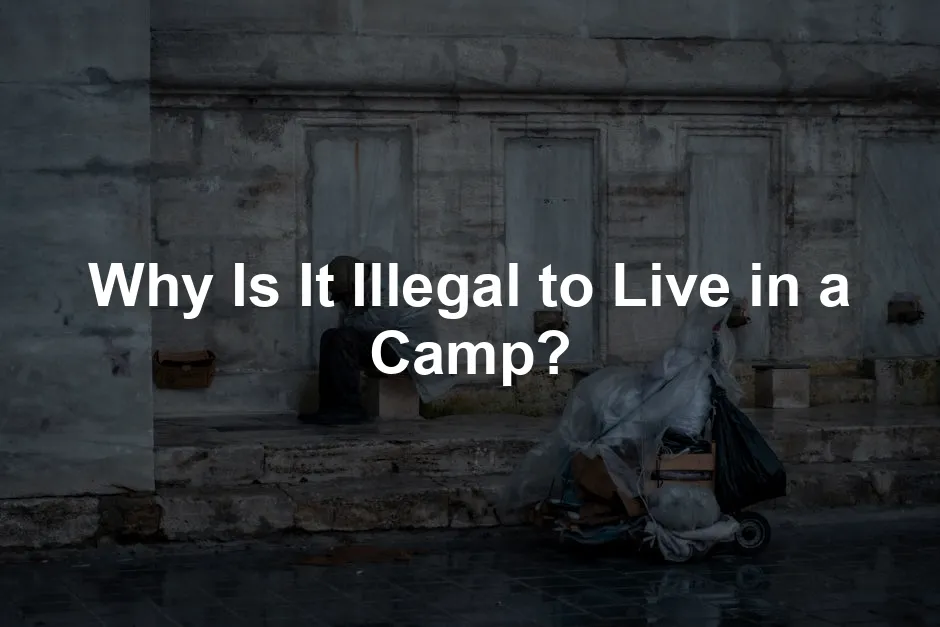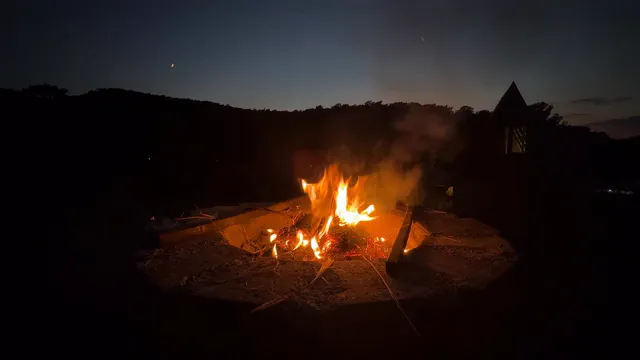
Why Is It Illegal to Live in a Camp?
Introduction
Living in a camp may conjure visions of idyllic evenings spent beneath the stars, surrounded by nature’s beauty. However, for many, that desire clashes with a harsh reality: the law. Across various jurisdictions, the question of whether it’s legal to camp in public spaces has become a contentious issue, often linked to broader societal challenges such as homelessness and public safety. In this article, we will untangle the complex web of regulations surrounding camping, examining the rationale behind the bans, the legal landscape, and the ethical implications of these laws. Strap in as we venture into the perplexing world of camping legality, where the simple act of pitching a tent can lead to fines, legal battles, or even worse.
Camping laws tend to vary significantly depending on location. In urban areas, cities enforce strict anti-camping ordinances. These laws aim to address public safety, health concerns, and the impact of encampments on local communities. Often, the very places that spark our desire for freedom become the backdrop for legal disputes. It’s a classic tale of wanderlust versus societal norms.
But before you pack your bags and grab your gear, consider the essentials for a successful camping trip! A Camping Hammock with Tree Straps can transform your outdoor experience, allowing you to relax and unwind while enjoying the fresh air. Plus, it’s lightweight and easy to set up, so you can spend less time assembling and more time enjoying your surroundings!
The question of legality brings to light issues surrounding homelessness. Many individuals seeking shelter find themselves at odds with these laws. Critics argue that anti-camping legislation dehumanizes vulnerable populations, failing to provide adequate alternatives for those in need. As we dissect this topic, we must consider the balance between maintaining public order and showing compassion for those facing hardships. In the end, understanding the laws surrounding camping is crucial for anyone wanting to enjoy the great outdoors, as ignorance can lead to unexpected legal consequences. Whether you’re a seasoned camper or a curious newbie, it’s essential to grasp the implications of these laws in your quest for adventure.

Summary of Key Points
Understanding why it is illegal to live in a camp requires a multifaceted approach. Here are the key points we will explore:
- Public Health Concerns: Unregulated camps often lead to sanitation issues and the spread of diseases, prompting local governments to impose bans.
- Safety Risks: Camping in urban areas raises safety concerns, including potential criminal activity and fire hazards, which cities aim to mitigate through legal restrictions.
- Zoning Laws: Local ordinances dictate where and how individuals can camp, with many jurisdictions preventing long-term camping on both public and private properties.
- The Impact on the Homeless: Anti-camping laws often disproportionately affect homeless populations, raising ethical questions about the treatment of vulnerable individuals without adequate housing options.
- Legal Challenges: Recent court rulings, such as Martin v. City of Boise, have questioned the legality of anti-camping ordinances when sufficient shelter beds are unavailable.
- Alternatives and Solutions: The article will also discuss potential solutions for both campers and municipalities, including designated camping areas and safe parking initiatives.
This article aims to shed light on the various facets of camping legality, from public health to ethical considerations, and will leave readers with a deeper understanding of this pressing issue.

Understanding the Legal Framework
Camping regulations are like a box of assorted chocolates—full of surprises! Depending on where you are, the rules can change dramatically. Let’s break down the types of land and the legalities of pitching a tent.
Types of Land and Camping
- Public Land: National and state parks offer splendid vistas and are often the go-to spots for campers. However, just like a VIP section at a concert, you need a permit to enjoy the show. Each park has specific regulations regarding camping. For instance, developed campgrounds usually require reservations and fees. Dispersed camping—where you set up camp away from established sites—may require a permit too. Ignoring these guidelines could lead to hefty fines. So, always check in before you head out into nature!
- Private Property: Camping on private land is a different ballgame. If you want to set up camp at your friend’s place, you need their blessing. Local zoning laws play a significant role here. They dictate where camping is permissible, and many areas restrict camping on residential properties. Even if you’ve got a friendly neighbor, zoning ordinances can turn a fun camping trip into a legal nightmare. Consent from the property owner is essential, so don’t forget to ask before you crash their backyard barbecue!
And speaking of camping essentials, don’t forget to bring along a Portable Camping Chair. You’ll thank yourself when you’re lounging by the campfire instead of sitting on the ground like a rock star at a festival! This chair is lightweight, easy to carry, and will save your back from the wrath of the earth.

Anti-Camping Ordinances
- Urban vs. Rural Areas: Camping laws often wear two faces: strict in urban settings and more relaxed in rural areas. In cities, anti-camping ordinances are common. These laws aim to manage public spaces, addressing health concerns and safety issues linked to encampments. Meanwhile, rural areas tend to be more lenient, allowing for a more relaxed camping experience. But don’t let your guard down! Even in rural settings, local laws can vary, so it’s wise to research before setting up your tent.
- Enforcement Challenges: The enforcement of camping laws can feel like a game of Whac-A-Mole. In some areas, local law enforcement focuses on public safety, while in others, they may turn a blind eye to campers. Factors like political climate and community responses can shape enforcement practices. Some cities prioritize cleaning up encampments, while others recognize the need for safe spaces and resources for the homeless. This inconsistency often leads to confusion and frustration for campers and locals alike.
In summary, understanding the legal framework surrounding camping requires navigating a patchwork of regulations. Whether you’re planning a weekend getaway or considering long-term camping, it’s crucial to grasp the local laws governing public and private lands. Happy camping, and may your adventures be free of legal entanglements!

Ethical Implications of Anti-Camping Laws
The Homeless Crisis
Anti-camping laws aren’t just a legal nuisance; they often hit the most vulnerable populations the hardest. Picture this: someone experiencing homelessness, seeking shelter for the night, only to be criminalized for their basic need for safety. It’s a disheartening scenario that raises serious ethical questions.
The impact on homeless individuals can be devastating. These laws don’t just prevent camping; they strip people of their dignity. By criminalizing their existence, society sends a message that their lives are less valuable. Advocacy groups argue that instead of addressing the root causes of homelessness, such as lack of affordable housing and mental health support, cities choose to push people out of sight, hoping the problem will magically disappear. This approach not only fails to provide solutions but also perpetuates a cycle of suffering.
Human rights concerns also come into play. Numerous organizations, including the American Civil Liberties Union, assert that criminalizing homelessness violates basic human rights. The argument follows that if there are insufficient shelter beds available, it’s unjust to penalize individuals for sleeping outside. Laws should protect people, not punish them for their unfortunate circumstances. Criminal records can hinder access to jobs, housing, and social services, making it even harder for these individuals to escape their situation.

Legal Challenges and Recent Rulings
One pivotal case in this discussion is Martin v. City of Boise. In 2018, the Ninth Circuit Court of Appeals ruled that cities cannot enforce anti-camping ordinances when there are not enough shelter beds available. This landmark decision forced many cities to reconsider their approach to homelessness and camping laws. It highlighted the inherent contradiction in punishing individuals for sleeping outside when safer alternatives are not provided.
The implications of this ruling extend beyond the courtroom. Cities are now faced with the challenge of balancing public safety with the need for humane treatment of the homeless population. Many have begun to reevaluate their policies, aiming to create more inclusive solutions rather than simply pushing the problem away.
Potential reforms are on the horizon. Some cities are exploring alternative approaches, such as designated camping areas and safe parking initiatives. These solutions aim to provide a safe space for individuals while also addressing the concerns of local residents. By creating environments where homeless individuals can reside without fear of arrest, cities can foster a sense of community and dignity.
Moreover, investing in supportive services, such as mental health resources and job training programs, can make a significant difference. These initiatives address the underlying issues that contribute to homelessness and help individuals reintegrate into society. As we ponder the legality of camping, it’s crucial to consider the ethical implications and our responsibilities as a community to ensure that all individuals are treated with respect and compassion.

Safe Parking Initiatives
In recent years, several municipalities have recognized the need for safe parking programs. These initiatives aim to provide a secure place for individuals living in vehicles, offering not just a spot to park but also access to essential services. For example, San Francisco has implemented a program that allows people to park overnight in designated areas while receiving support from outreach teams. This initiative provides a sense of security and community for those facing homelessness.
Another noteworthy example comes from Los Angeles, where the Safe Parking LA program has transformed unused lots into safe overnight parking spaces. Participants can access services like showers, meals, and case management. This approach not only provides immediate relief but also connects individuals to resources that can help them transition into stable housing situations.
Looking ahead, there are various ways to expand and improve these safe parking initiatives. One potential direction is the integration of additional support services. By collaborating with local non-profits, municipalities could offer on-site healthcare, job training, and mental health resources. This holistic approach could empower individuals, helping them regain stability. And while you’re at it, make sure to pack a Camping Cookware Set to whip up a delicious meal while you’re out in nature! Nothing says “I love the outdoors” like a gourmet meal prepared over a campfire.
Furthermore, expanding the number of designated safe parking areas can address the growing demand. Cities can explore partnerships with churches or community organizations to utilize their parking lots during off-peak hours. By fostering community involvement, cities can create a network of support that bolsters these programs, ultimately making a meaningful impact on homelessness.
FAQs
What are common reasons for camping bans?
Cities often impose camping bans due to public health concerns. When individuals camp in public spaces, sanitation issues can arise. Poor waste disposal leads to unpleasant odors and potential disease outbreaks. Safety is another factor; unauthorized camps can create hazards and attract criminal activity. Local governments aim to maintain public order and a safe environment, which can clash with the desire to camp freely.
Are there exceptions to anti-camping laws?
Yes, there are exceptions! Many areas designate specific camping zones where individuals can legally set up camp. Obtaining permits for these areas is usually necessary. National and state parks often allow camping with a valid permit, making it essential to check local regulations before planning your adventure. Remember, following the law ensures a hassle-free outdoor experience!
What legal consequences can arise from illegal camping?
Engaging in illegal camping can result in various legal repercussions. Common consequences include fines, which can range from a small fee to an amount that stings your wallet. Citations may also be issued, leading to a record that complicates your life further. In severe cases, individuals could face arrest, especially if they repeatedly violate local ordinances. It’s always best to stay informed and compliant!
How can I find legal camping options?
Finding legal camping options is easier than you think! Start by researching local ordinances specific to your desired camping area. Websites for national and state parks provide guidelines on where you can camp legally. Many cities also post information about designated camping sites, making it easy to plan your trip. Being proactive can save you from unnecessary fines or legal trouble!
What impact do these laws have on the homeless?
Anti-camping laws significantly affect homeless individuals. These laws can criminalize their basic need for shelter, making it difficult for them to find safe places to sleep. Critics argue that such legislation fails to address the root causes of homelessness, such as lack of affordable housing and support services. Instead of helping, these laws can create barriers to accessing necessary resources and assistance.
Please let us know what you think about our content by leaving a comment down below!
Thank you for reading till here 🙂 And don’t forget to grab a LED Camping Lantern for those magical evenings under the stars—because nobody likes stumbling around in the dark!
All images from Pexels




